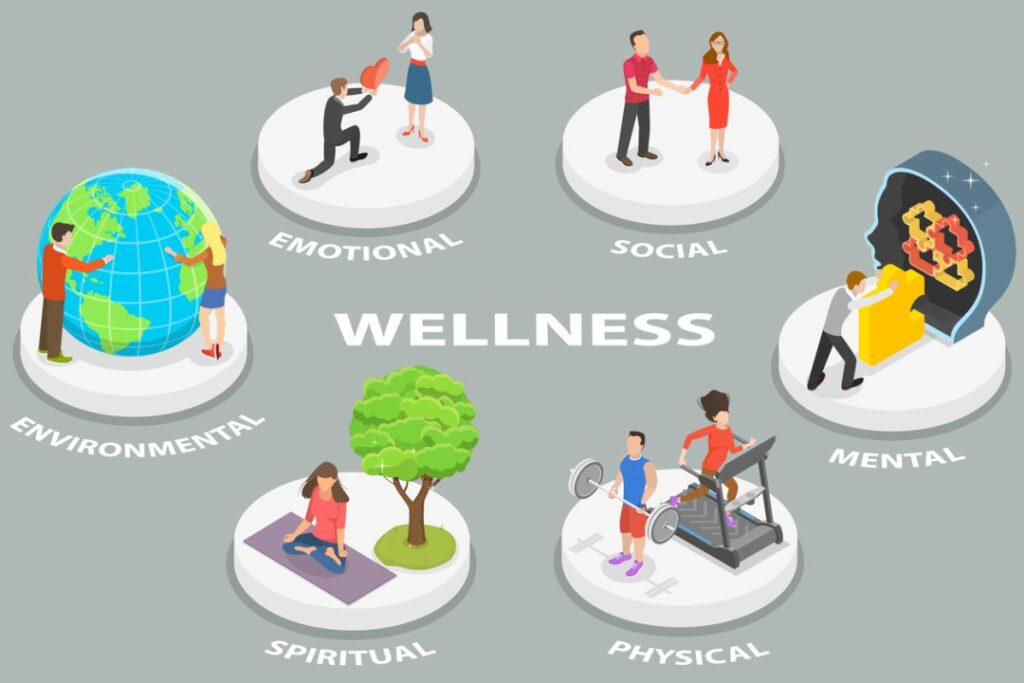Missouri promotes health and wellness through programs addressing physical and mental health challenges, improving healthcare access, and providing resources to support healthier living.
In this article, we will explore the aspects of health and wellness in Missouri, from physical and mental health to wellness programs and healthcare access. We will also discuss the importance of living a balanced and healthy life in Missouri, highlighting local initiatives and resources that support wellness for everyone.
The State of Health in Missouri:

Health Statistics in Missouri:
Missouri has made notable progress in various areas of healthcare, but the state still faces several health challenges. According to recent health statistics, Missouri’s overall health ranking varies, with areas like heart disease, obesity, and smoking rates remaining high.
- Obesity: Missouri has one of the highest obesity rates in the nation. Many residents face difficulties related to weight management, which can lead to other health problems such as diabetes, heart disease, and joint issues.
- Heart Disease: Heart disease remains one of the leading causes of death in Missouri. Unhealthy diets, lack of exercise, and smoking contribute to the high rates of cardiovascular diseases.
- Smoking: Smoking is another significant health concern in Missouri. Despite the known risks, a large number of adults still smoke, which increases the rates of lung cancer and respiratory problems.
Healthcare Access in Missouri:
Access to healthcare is an essential factor that influences the overall health and wellness of Missouri residents. The state has a mixture of urban and rural areas, which creates both opportunities and challenges when it comes to healthcare availability.
- Urban Areas: Major cities like St. Louis, Kansas City, and Springfield have better access to healthcare services and wellness programs. These cities feature numerous hospitals, specialists, wellness centers, and fitness facilities.
- Rural Areas: On the other hand, rural areas face challenges related to healthcare access. Limited transportation, fewer healthcare providers, and longer wait times for appointments can make it difficult for residents in these areas to get the care they need.
Despite these challenges, Missouri has been making strides in expanding healthcare access and services. Programs aimed at improving rural healthcare access and affordable insurance options are a part of ongoing efforts to enhance overall health.
Mental Health in Missouri:
Addressing Mental Health Needs:
Mental health is a critical aspect of overall well-being, and Missouri is actively working to address mental health needs. Although stigma around mental health care persists, efforts to raise awareness and expand services are increasing. Initiatives focus on providing access to mental health care for all individuals and encouraging a broader understanding of its importance. The state is committed to improving mental health services and making them more accessible to those who need them most.
Mental Health Resources:
Missouri offers a variety of programs for mental health support, including counseling services, addiction treatment, and crisis intervention. The Missouri Department of Mental Health (DMH) plays a vital role in these efforts, connecting individuals with necessary care. Nonprofits, local clinics, and state-run facilities work together to ensure those experiencing mental health struggles have access to professional support, whether for ongoing therapy, rehabilitation, or urgent care services.
Also read: Embark Behavioral Health – A Path To Better Mental Wellness!
Public Awareness:
Missouri is launching public awareness campaigns to promote mental health care and overall well-being. These initiatives aim to educate the public about mental health, reduce stigma, and encourage seeking professional help. Through outreach, the state seeks to normalize conversations about mental health, emphasizing that mental wellness is just as important as physical health. These efforts are helping more individuals recognize signs of mental distress and take proactive steps toward improving their mental health.
Mental Health Challenges:
Mental health struggles, including anxiety, depression, and substance abuse, are widespread in Missouri. The COVID-19 pandemic exacerbated these issues, leading to increased isolation and uncertainty. This has caused more individuals to seek therapy and other support services. As people face mounting stress and emotional distress, the state is focused on offering additional resources to help those affected by mental health challenges, promoting well-being, and reducing barriers to mental health care access.
Wellness Programs and Health Initiatives in Missouri:

Community Health Programs:
Missouri is home to a variety of health and wellness programs that focus on physical activity, healthy eating, and community involvement. These programs aim to improve public health and empower individuals to take charge of their well-being.
- The Missouri Department of Health and Senior Services (DHSS): This government agency provides educational resources, health programs, and services to the residents of Missouri. Their initiatives focus on preventive care, including vaccination programs, nutrition education, and promoting healthy lifestyles.
- Local Fitness Programs: Many communities have fitness programs that offer activities such as yoga, aerobics, and group fitness classes. These programs are often free or low-cost, making them accessible to all residents.
- Nutrition Initiatives: Missouri has several initiatives aimed at improving nutrition and healthy eating habits. For example, “Show Me Healthy Women” provides free screenings for breast and cervical cancer, encouraging women to maintain regular health check-ups.
State-Sponsored Health Campaigns:
The state of Missouri runs several health campaigns to tackle major health concerns. These campaigns promote healthy behaviors and encourage people to get regular health checkups.
- Tobacco-Free Missouri: This program works to reduce smoking and tobacco use among Missouri residents. It includes public education campaigns, smoking cessation programs, and policies to create smoke-free environments.
- Get Healthy Missouri: This is an ongoing initiative that encourages healthy living by promoting physical activity, healthy eating, and obesity prevention. It provides resources to individuals, families, and communities to help them make healthier lifestyle choices.
Local Wellness Centers and Facilities:
Missouri is home to numerous wellness centers that offer services related to physical fitness, mental health, and holistic wellness. These centers often provide gym facilities, group classes, and workshops that focus on well-being.
- St. Louis Wellness Centers: The city of St. Louis has some of the state’s best wellness centers, offering services like nutrition counseling, fitness training, and health screenings.
- Kansas City Health and Wellness: Kansas City also boasts a range of health centers that provide physical therapy, mental health services, and preventive care options.
These wellness centers are vital in promoting a healthy lifestyle and providing access to expert care for Missouri residents.
Physical Wellness: Staying Active in Missouri
Exercise and Fitness Opportunities:
Missouri offers numerous opportunities for residents to stay active, including parks, recreational areas, and organized sports. Physical wellness is an essential part of overall health, and the state supports many avenues for people to get moving.
- State Parks and Trails: Missouri is home to beautiful state parks and trails that provide excellent opportunities for hiking, biking, and outdoor activities. Parks such as Ha Ha Tonka State Park and Castlewood State Park are perfect for those who want to stay active in nature.
- Sports and Recreation: Missouri residents enjoy a variety of sports activities, from community soccer leagues to organized youth sports programs. Local gyms and fitness centers also offer classes in everything from Pilates to CrossFit, helping people get fit in a way that fits their lifestyle.
Also read: How To Prepare for a Couples Counseling Session
Healthy Eating:
A balanced diet is essential for wellness, and Missouri offers a wide range of healthy food options to help residents improve their nutrition. Fresh produce markets, farm-to-table restaurants, and nutrition workshops are just a few ways people in Missouri are focusing on their diet and making healthier choices.
- Farmers Markets: Missouri has an abundance of farmers’ markets that offer fresh produce and healthy food options. These markets are an excellent way for residents to support local agriculture while improving their diets.
- Healthy Eating Campaigns: Programs such as “Get Missouri Eating Healthy” provide tools and resources for families to make healthy eating choices. This includes meal planning tips, nutritional education, and resources for eating locally grown foods.
FAQ’s
1. What are the main health challenges in Missouri?
Missouri faces high rates of obesity, heart disease, and smoking, which contribute to various health problems among residents.
2. How does Missouri address mental health needs?
The state provides mental health resources such as counseling, addiction treatment, and public awareness campaigns to reduce stigma and improve access to care.
3. What health programs are available in Missouri?
Missouri offers community health programs focused on physical activity, nutrition, and preventive care, including initiatives like “Get Healthy Missouri.”
4. Are there wellness centers in Missouri?
Yes, Missouri has several wellness centers, particularly in cities like St. Louis and Kansas City, offering services like fitness training, mental health care, and health screenings.
5. How does Missouri promote healthy eating?
The state promotes healthy eating through farmers’ markets, nutrition programs, and campaigns like “Get Missouri Eating Healthy” to encourage better dietary habits.
Conclusion
Missouri is actively promoting health and wellness through various programs addressing physical and mental health challenges, improving healthcare access, and encouraging healthier lifestyles. Despite facing issues like obesity, heart disease, and smoking, the state has made strides in expanding healthcare, especially in rural areas. Wellness initiatives, local resources, and education continue to empower residents toward better overall well-being.Re




